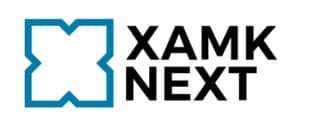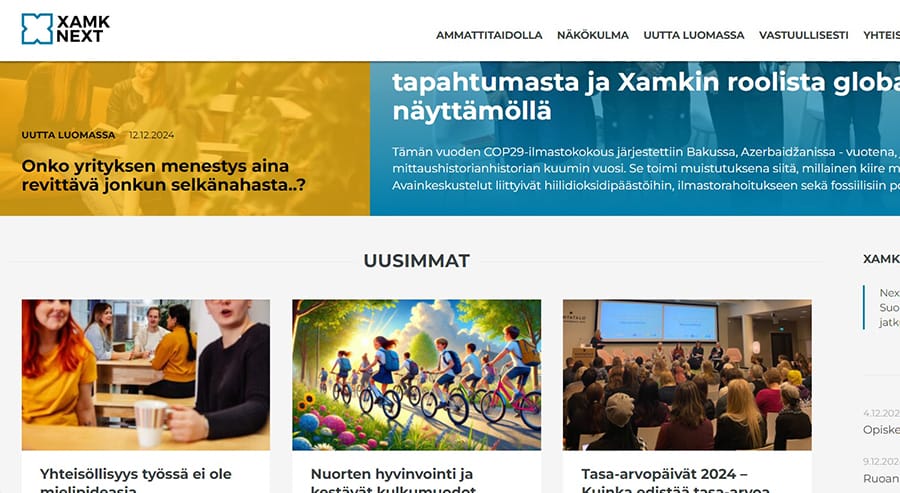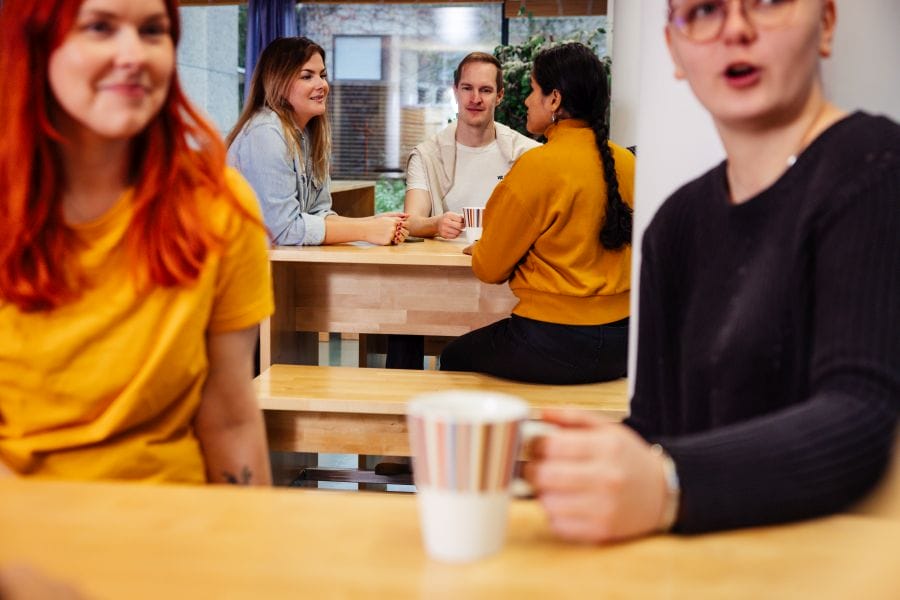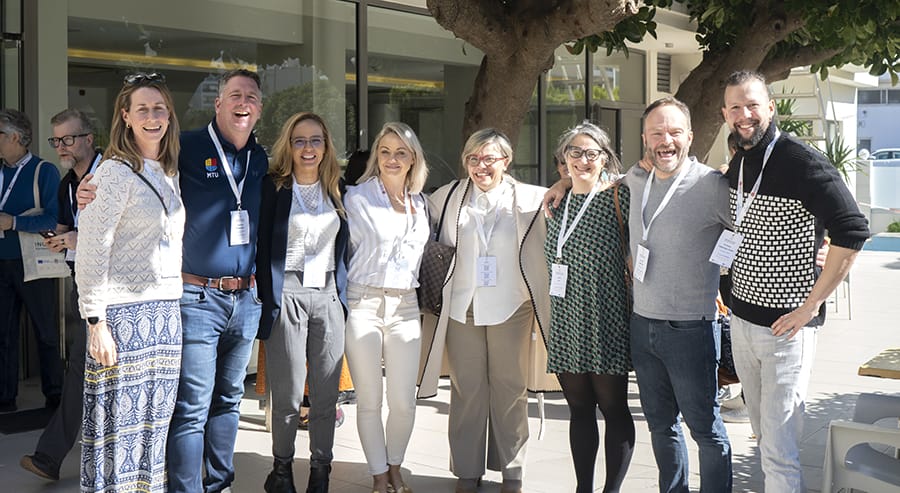Excellence in Education: Spreading Successful Methods Across Europe
The Staff Academy offers a chance to enhance instructional techniques, explore innovative teaching methods, and share practical strategies for effective knowledge transfer. It is the perfect opportunity to gain new ideas and adapt the latest pedagogical innovations for your teaching or RDI work.
Let’s explore the different pedagogical methods presented during the Staff Academy.
What do we mean by innovation in Higher Education?
Dr. Kallia Katsampoxaki-Hodgetts opened the Staff Academy event by giving an inspiring keynote speech on the meaning of innovation in Higher Education and pedagogy, where she effectively made the case that innovation is a continuous shared responsibility, requiring adaptability and openness to exploration, hopefully shaping an inclusive and resilient future.
She reflected on the achievements, key issues, and the need to collectively address educational research challenges, which involve reimagining approaches beyond technology, embracing inclusivity, and fostering active learning methodologies. The European University INGENIUM supports these collaborative efforts for a brighter future of learning.
Applying Board Games to Achieve Competences in Humanities
Assistant Professor Enrique Meléndez Galán from the University of Oviedo presented their novel project, which integrated board games into the realm of art and humanities teaching. The games “Time’s Up” and “Timeline” featured cards depicting historical events, characters, artworks, and literary creations designed to enhance critical thinking and collaboration. Through play, we learned firsthand how important it is to gain knowledge about a topic and blend verbal description, concise clues, and even mimicry in a fun activity. Teaching and learning can be more effective and enjoyable for everyone when games are afoot!
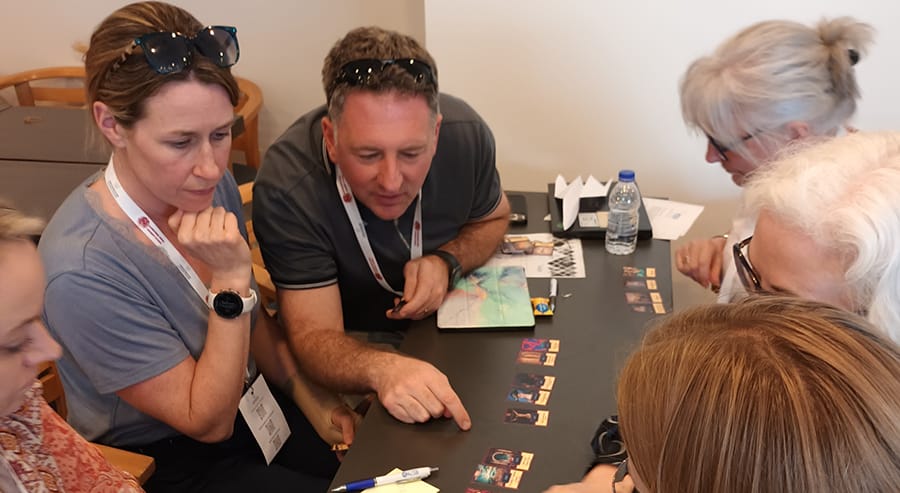
Exploring the Integration of Digital Twin and Mixed Reality Technologies
Associate Professor Cătălin Dosoftei and Teaching Assistant Gabriel Florentin Chiriac from Gheorghe Asachi Technical University of Iasi gave us the rare chance to experience educational innovation using Microsoft Hololens 2 to explore a learning environment that is both immersive and interactive. Their approach makes learning complex concepts educational, highly engaging, and enjoyable.
They showcased how these advanced technologies can enhance educational experiences, align with the digital preferences of students, and prepare them for the evolving demands of various industries. Their workshop emphasized the need to explore the intersection of cutting-edge technology and education to gain important insights and skills in a rapidly advancing digital world.
Cities of the World
In their interactive workshop, Full Professor Massimo Angrilli and PhD Candidate Valentina Ciuffreda from the University ‘G. D’Annunzio’, Chieti-Pescara took us on a collaborative educational journey that started with the narration of an educational experience consisting of a series of lectures focused on the cities of the world, featuring active collaboration from course students. We collaboratively pieced together an Atlas, which was like a dynamic mosaic.
The atlas served as a valuable resource for providing insights into the diverse urban landscapes within the INGENIUM network. We explored how collective knowledge and experiences can weave together to create a comprehensive and dynamic exploration of the urban environments shaping our educational and research horizons.
Serious Games
Senior Lecturers Salla Vaahersalo and Petteri Oinas from the South-Eastern Finland University of Applied Sciences facilitated an engaging and competitive workshop on the Dot Game, which showcased how game-based learning teaching methods can be used in action. It is particularly useful to show how to make concepts and KPIs can be made more concrete.
After dividing into two teams (each with eight different roles), the teams produced post-its notes containing different colored dots, and in two rounds, we got to test batch production and one-piece flow. The team competition works incredibly well to reinforce learning. This teaching method has huge transferable potential and is adaptable to many different contexts.
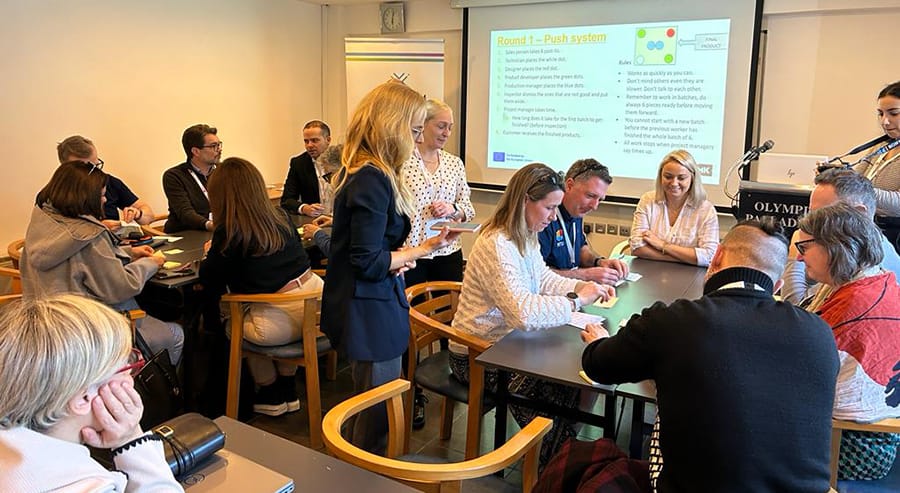
The LiveLab KaPIL – Karlsruhe Platform Innovation Lab
From the Karlsruhe University of Applied Sciences, Researcher & Lecturer Patrick Brecht walked us through the Live Lab KaPIL or Karlsruhe Platform Innovation Lab. The Live Lab KaPIL utilizes the Massive Open Online Course (MOOC) “Platform Strategy for Business” by Prof. Marshall van Alstyne on edX.org. We were shown how students become familiar with the theoretical platform and then learn how to apply theoretical knowledge through a real-world problem.
In a typical iteration of the course, students explore various business models on the platform and present them to partner companies at the end of the semester. KaPIL has excellent potential to foster more profound and meaningful connections between working life and educational institutions.
Experiential learning of the EU through simulation as a tool for European citizenship and democratic values awareness
Dr. Stylianos Ioannis Tzagkarakis from the University of Crete presented their work on fostering citizenship and promoting active democratic engagement within the classroom. In the session, we participated in a simulation activity of the European Parliament to gauge the significance of this alternative-experiential learning method in promoting active citizenship and learning the functions and importance of this democratic institution through active participation in simulating a part of the plenary legislative procedure.
We learned about the direct impact of these learning methods on students’ understanding of institutions and their awareness of democratic principles, which could significantly improve the health of our democracies worldwide.
The use of immersive and accessible technologies in the teaching of Civil Engineering
Dr. Mary Moloney and Dr. Jeremiah Spillane from Munster Technological University showed us how the use of immersive 360-degree video and photographs, viewed in virtual reality headsets or via 360-degree media players, can enhance and broaden the student experience when undertaking Project Based Learning (PBL) assignments. The demonstration included an array of mediums in which a Virtual Site Visit (VSV) was shared with us. We learned how real and innovative PBL assignments can be set for students by using coverage of real buildings.
This pedagogical approach could allow educators to use particularly interesting or challenging case studies once a VSV has been generated. The implications are especially significant for students who may have accessibility issues, as this method allows everyone to experience interesting structures from around the world in a much more meaningful way without ever leaving the classroom.
Innovative Digital Approaches to Teaching and Learning: Simulation-based education
From the Medical University Sofia, Professor Emilia Karova and Senior Expert Magdalena Kasnakova showed us how new digital simulation techniques transform dental education. The transition of the learning process from a traditional model-based technique to entering clinical practice has been smoothed with the help of simulation methods (incl. simulation activities, role play, part-task trainers, and immersive simulation).
They explained how simulation-based learning techniques were incorporated into the dental curriculum to establish a pre-clinical skill set for students, supported by modernizing university teaching spaces and laboratories. We were shown how this simulation-based education functions in practice and the benefits for student learning as it increases participation possibilities without static models.
3D printing pedagogical tools for pediatric surgery

Associate Professor Laurent Delbreith from the University of Rouen, Normandy, demonstrated how they developed a training program for all surgical residents using models entirely printed in 3D.
They explained how 3D printing creates cost-effective, high-quality models with readily available materials – making them an excellent, cost-effective, and accessible alternative to simulators.
They freely share their models, tested and validated in Rouen, across these different platforms to democratize access to advanced surgical training and foster a collaborative environment for continual learning and improvement in the medical field.
Teaching the Dark Art of Deception: A Workshop on Pedagogical and Ethical Challenges when Students Roleplay as Attackers
From the University of Skövde, Associate Professor Marcus Nohlberg walked us through the dangers of social engineering, a manipulation tactic by attackers to gain sensitive information or disrupt security through deception, targeting human vulnerabilities rather than technological flaws. In the workshop, we experienced a lesson that incorporated offensive and defensive cybersecurity skills. We were treated to insights into the mindset of an attacker.
We were tasked with ethical reflection, managing competition in learning environments, and balancing the intrigue of hacking with responsible knowledge application. This method aims to teach students to think like attackers yet respect ethical limits. This is done using the debriefing method to solidify learning outcomes and ensure knowledge is used ethically.
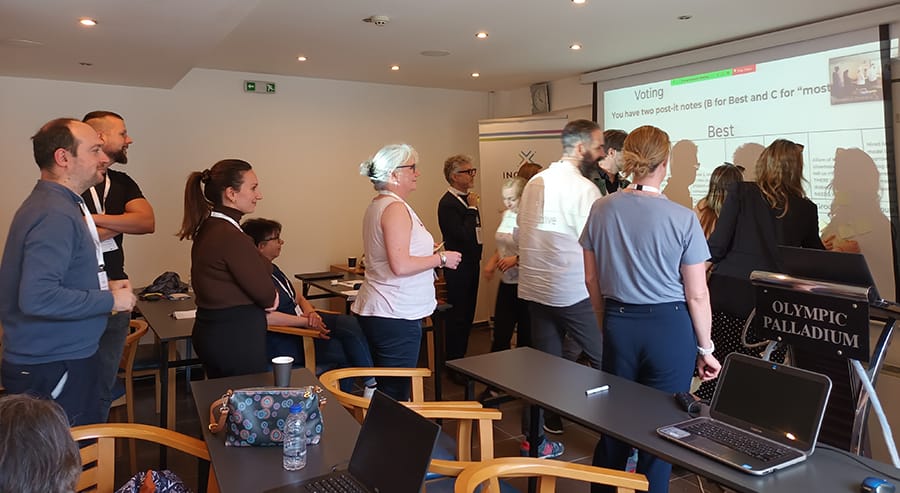
Each of these Staff Academy sessions helps foster creativity and innovation within the European University INGENIUM as we strive to create a European-wide teacher community for the good of all. The Gheorghe Asachi Technical University of Iasi will host the next Staff Academy in May 2024. If you’d like to read about past events, please visit: https://next.xamk.fi/uutta-luomassa/perfect-pedagogical-practices-sharing-best-practices-across-europe/
